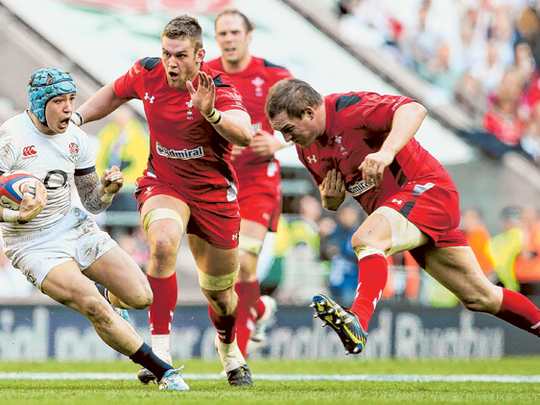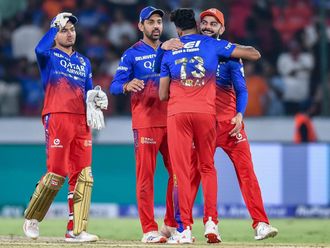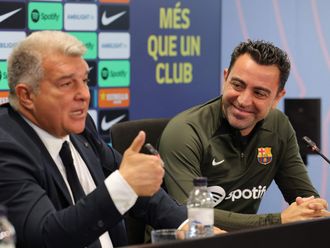
Dubai: After an emotional day in the Irish capital, Ireland’s Six Nations destiny is theirs to define. A win in France — where they have only triumphed once in 42 years — would be the perfect swansong for Dubliner Brian O’Driscoll, who inspired them to their magical Parisian night in 2000.
O’Driscoll has played the protagonist in an epic journey that came to its Dublin curtain call at the weekend, while he will sign off from the international game for good after Saturday’s showdown with France. Fighting back the tears after he had rolled back the years against Italy for 60 minutes in front of emotional Irish eyes, the record-making 140-capped centre stood before his upstanding, adoring public for the last time adorned in the Emerald jersey he reveres so highly. It was a symbol befitting a modern legend of the game.
Joe Schmidt’s side’s +81 points difference leaves them comfortable favourites for the crown if they can overcome France in Paris. The meeting of green and blue could indeed be rugby gold, but that is provided France play with the fluent attacking prowess of a Eurofighter jet that they demonstrated in the last ten minutes against England on the opening weekend.
As for the House of Lancaster’s Red Rose, despite claiming the Triple Crown for the first time since 2003 (their World Cup-winning year), they will be painfully lamenting their fallibility in Paris. If they had shown more focus in defence, that heart-breaking Gael Fickou break-away try wouldn’t have happened and they would be looking at a Grand Slam if they defeated Italy in Rome this weekend.
Since that Paris loss, England’s rose has bloomed quickly — as they showed in their character-defining 13-10 defeat of Ireland and their 29-18 thumping of Wales on Sunday.
But for England’s lack of discipline, the margin between them and their old rivals would have been a far greater chasm than a mere 11 points. Courtney Lawes and Joe Launchbury are gelling into one of the best second row partnerships in the world; Mike Brown gets stronger, quicker and more reliable every game; Luther Burrell is proving to be a deadly finishing force; and Danny Care is the front foot cutting-edge England have lacked.
But as good as England were, Wales were equally as bad. Their embarrassed, draconian face was only saved by the ever-excellent right boot of Leigh Halfpenny, who is in Lions form in perpetuity.
Warren Gatland’s tactics — to kick long and uncontested to one of the best full-backs in the world on current form — was obscure and just wrong. On the rare occasions that George North and Jamie Roberts got their hands on the ball in open play, they looked dangerous, and North even squandered a gaping try-scoring chance when the scores were still tight in the first half.
Wales’ Kiwi head coach said before the game it could be a case of men against boys. He was right. Wales looked like old, greying men and England looked like success-hungry youngsters learning a winning acumen.
The Saturday afternoon match at Murrayfield was, in all honesty, a barely intriguing sub-plot to the rest of the weekend’s action. Scotland continue to frustrate and were fortunate to score their try through Stuart Hogg after some soporific French defending under a high ball. The questions over Scott Johnson’s future in the highlands are starting to get louder and more persistent.
But Les Bleus’ bizarre last minute penalty win (taken hurriedly by Jean-Marc Doussain as though they needed to score again — almost letting Scotland back in with a chance) keeps things interesting for their clash with Ireland.
Philippe Saint-Andre said after the game there’s no such thing as a ‘bad win’, but that’s simply PR greenwash (or bleu-wash in this case) as bad as the Murrayfield turf — and I suspect the French head coach knows it too.








